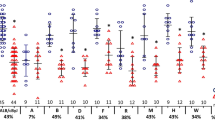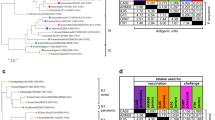Abstract
BOTH intact bacillus Calmette–Guerin(BCG)1–3 and the methanol extraction residue (MER) fraction4 of BCG have had extensive application in tumour immunotherapy. Treatment with MER nonspecifically stimulates both the cellular and humoral immune systems4,5, and has been successful in tumour immunotherapy in a number of animal models6,7. Experiments in our laboratories, using animals obtained from the Weizmann Institute, Rehovot, Israel, have shown that about 40% of strain 2 guinea pigs injected with MER or with the supernatant of sonically-disrupted BCG (BCG SS), 1–2 months before intradermal inoculation with 106 cells of the transplantable line 10 hepatocarcinoma8,9, are resistant to the growth of this tumour10. Similarly, injection of MER into developing tumour nodules 7d after tumour cell implantation results in complete tumour regression in approximately 40% of the animals tested (M.A.W., P.M. and D.W.W., unpublished).
This is a preview of subscription content, access via your institution
Access options
Subscribe to this journal
Receive 51 print issues and online access
$199.00 per year
only $3.90 per issue
Buy this article
- Purchase on Springer Link
- Instant access to full article PDF
Prices may be subject to local taxes which are calculated during checkout
Similar content being viewed by others
References
Old, L. J., Clarke, D. A., and Benacerraf, B., Nature, 184, 291–292 (1959).
Mathe, G., Kamel, M., Dezfulian, M., Halle-Pannenko, O., and Bourut, C., Cancer Res., 33, 1987–1997 (1973).
Pimm, M. V., and Baldwin, R. W., Int. J. Cancer, 15, 260–269 (1975).
Weiss, D. W., Natn. Cancer Inst. Monogr., 35, 157–171 (1972).
Ben-Efraim, S., Constantini-Sourojon, M., and Weiss, D. W., Cell Immun., 7, 370–379 (1973).
Haran-Ghera, N., and Weiss, D. W., J. natn. Cancer Inst., 50, 229–234 (1973).
Hopper, D. G., Pimm, M. V., and Baldwin, R. W., Br. J. Cancer, 31, 176–181 (1975).
Zbar, B., Bernstein, I., Tanaka, T., and Rapp, H. J., Science, 170, 1217–1218 (1970).
Zbar, B., and Tanaka, T., Science, 172, 271–273 (1971).
Minden, P., Wainberg, M., and Weiss, D. W., J. natn. Cancer Inst., 52, 1643–1645 (1974).
Barnes, J. M., J. Path. Bact., 77, 371–380 (1959).
Minden, P., Sandridge, J., Wainberg, M. A., and McClatchy, J. K., J. natn. Cancer Inst. (in the press).
Meltzer, M. S., Leonard, E. J., Rapp, H. J., and Borsos, T., J. natn. Cancer Inst., 47, 703–709 (1971).
Brambell, F. W. R., in Transmission of Passive Immunity from Mother to Young, 142–165 (North-Holland, Amsterdam, 1970).
Author information
Authors and Affiliations
Rights and permissions
About this article
Cite this article
WAINBERG, M., MINDEN, P. & WEISS, D. Vertical transmission of tumour resistance in guinea pigs. Nature 259, 213–215 (1976). https://doi.org/10.1038/259213a0
Received:
Accepted:
Issue Date:
DOI: https://doi.org/10.1038/259213a0
This article is cited by
-
Convergent evolution of a genomic rearrangement may explain cancer resistance in hystrico- and sciuromorpha rodents
npj Aging and Mechanisms of Disease (2021)
Comments
By submitting a comment you agree to abide by our Terms and Community Guidelines. If you find something abusive or that does not comply with our terms or guidelines please flag it as inappropriate.



